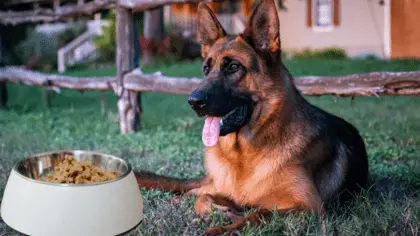German Shepherds are well-known for being intelligent, energetic, muscular canines with noble personalities. Today’s topic is for individuals who are concerned about their German Shepherd not eating because they generally come running into the kitchen to grab their meal. But Why Is My German Shepherd Not Eating and Behaving Strangely?
Actually, they avoid eating when they don’t feel well because of environmental or medical changes, boredom with the same meal, stress or anxiety, illnesses such as viruses or germs, stomach sensitivity, oral difficulties, or personal preference. Sometimes they become picky eaters, refusing to eat until they get what they want.
Anyway, if you are looking for tips to bring the GS dog back to eating like a regular German Shepherd, you have to go through the whole article. We have the best tips for your dog, so let’s have a look below.
The German Shepherd Not Eating: 15 Possible Causes

Changed Environment or Routine
The first and most common reason the German Shepherd stops eating is when they face a new daily routine. We frequently change our environment or routines, such as switching to a new house, adding another family member, getting a pet, losing a pet, or just a shift in working time that makes the dog uninterested in eating.
Separation Anxiety
The owner is always their closest friend! They may have separation anxiety as a result of not being able to see their owner, or they may start barking or whining while you are away. They want to feel secure, so they don’t prefer new things and are stressed by the new environment.
See More: How To Stop a German Shepherd From Barking?
Owner Is Missing
An owner is trying to make the dog eat but failing. So, the pet owner asked, “Why would our German Shepherd refuse to eat her dog food unless we are sitting with her but be extremely interested in our food?”
If they miss their owner or the owner’s absence, they stop eating because they are social pets and try to be with the owner’s family. Also, when the master does not give them enough time, they become emotional and eventually quit eating.
Feeling Low
Sometimes the dog becomes depressed and doesn’t feel better. It could be because of a food issue or illness such as kidney failure, infection, or cancer, which causes them to simply refuse to eat even when they are hungry.
Eating Garbage or Poisonous Elements
They may have eaten poisonous plants or garbage while roaming the garden or fields. However, they feel happier if you get them the free-falling stream system because they cannot always receive fresh water, which makes them feel down.
You may search for: What Happens If A Dog Eats Maggots?
Bored With The Same Food
Dogs, like people, can lose interest in the same foodstuff. You can include different dry foods, add some wet meal to their dry meal, or soak the dry dog food in unsalted broth or warm water. To start, give your shepherd some bits of meat or toys to ensure the food boredom issue. If they are content, it’s really time to make some changes to their eating habits.
When The Dog Ate Something That they Shouldn’t
Your GSD may occasionally consume something that they should not, such as excessive fat or spoiled food. Or, if they are regularly eating, do not force them to consume anything. Otherwise, they will stop eating and become upset.
Lack of Appetite
Some of the German Shepherd owners asked, “My 7-week-old German Shepherd dog is weak, has lost appetite, and has watery eyes. So, what should I do?” Basically, your dog’s tiredness and lack of appetite are both reasons to be concerned.
Some dog medications cause nausea, which might impair your dog’s appetite. Medication that causes the Shepherd to lose the appetite includes chemotherapy, pain relievers, and some antibiotics.
Dogs’ appetites drop as they mature, and they might lose weight. Picking food for aging can substantially support with appetite concerns.
A low-protein dog diet is also unsuitable for an elderly dog. You also have to choose large-breed dog food. Additionally, stress hormones might restrict appetite at times.
Overfeeding Dog
Generally, dogs will eat whatever you serve them. If your dog isn’t hungry at mealtimes, don’t overfeed them because overeating will cause them to stop eating completely.
Oral or Dental Problem
Dental problems or toothaches are also common signs that cause the German Shepherd to stop eating due to pain. Most commonly, fractured teeth, teeth root abscesses, gum recession, or teething possibly cause ache in the dogs mouth, making chewing distressing for the dog.
Anxious or Stressed Shepherd
Your dog can become unhappy, stressed, or anxious in the same way that we do. If the Shepherd spends long periods of time alone at home, he may be stressed and anxious. Overstress might ultimately present as stomach troubles or a loss of your dog’s appetite, so they stop eating.
Related Article: How To Leave Dog Alone For 12 Hours
Shepherds Are Picky Eater
German Shepherds are picky eaters that favor their own preferences. If they enjoy scraps and treats, they will never try dry canine kibble. It’ll be ideal if you could simply buy a 30-pound or 14-kg bag of dry dog food once a month or feed it to the German Shepherd, who will eventually become a dog who is picky eater.
Food Routine
German Shepherds, like humans, have their own food schedule. German Shepherds usually take one meal in the morning and one in the evening. Therefore, keep track of how much food the German Shepherd eats in total because this will assure the meal quantity they desire throughout the day. If you miss them, they won’t eat!
Stomach Sensitivity or Food Allergy
German Shepherds have sensitive stomachs, so they are particularly sensitive to food allergies. If the meal causes diarrhea or vomiting frequently for allergies, the dog will be unwilling to eat.
Lack of Exercise
Exercise maintains good health. As a result, if the canine does not get enough exercise, its appetite will drop. Older German Shepherds require approximately 2 hours of exercise each day. Additionally, offer them a little food to ensure avoid overeating to weight gain.
Gastrointestinal Parasites May Influence
This is another condition that prevents your shepherd from eating. It exhibits so many symptoms that you may detect loss of dogs appetite or unusual weight loss with several of them, including stomach, round, or threadworms.
Medicinal Effect
Sometimes the owner gives the dogs new medicines that make them feel uncomfortable while eating. Furthermore, the unfavorable side effects of any medication can lower the dog’s appetite, cause nausea, or cause gastrointestinal difficulties.
Taking Vaccinations
Some vaccinations can possibly impact the German Shepherd’s appetite and maybe the fact that they refuse to eat. They take a rest from everything due to the vaccination effect, so they don’t want to eat.
Shepherd Getting Older
Older dogs started to lose their physical appearance along with their appetite. They become less active and sometimes they stop eating regularly.
So, if you find any of these problems with your lovely pet German Shepherd, make sure you take proper care and, if necessary, meet with a veterinarian.
Why is German Shepherd not eating and vomiting?

The German Shepherd sometimes vomits and quits eating due to digestive issues, and they usually vomit due to overeating. They may also have diarrhea or weight loss, as well as diseases such as intestinal or pancreatic disorders, food sensitivities, and allergies.
As a result, it’s critical to give your dog’s digestive system some time to recover by not feeding your dog for 12 to 24 hours. You can offer your dog small quantities of water to keep them hydrated at that time.
Why did my German Shepherd stop eating dry food?
Many dogs will refuse to eat if they are not feeling well, especially if they have digestive or dental problems. They stop eating dry kibble and begin drinking soft broth and water. If meat or meat byproducts are not the primary component, change the food.
Usually, due to dental problems, they avoid dry foods as they hurt their teeth. Also, dogs appear to avoid dry foods because of the freshness level of the food, or perhaps they prefer new food, or perhaps they don’t like it; the dog food might be stale, out of date, or simply terrible tasting.
Why are German Shepherds not eating and having diarrhea?
The first thing to consider is your dog’s sensitive tummy, which causes diarrhea. Bacterial infections, stress, medication, parasites, or sickness are the most common causes of German Shepherd diarrhea.
Diarrhea can also be caused by an abrupt diet change, consuming poisonous foodstuffs, food allergies, or excess eating. Pets with chronically overflowing diarrhea or chronically soft stool should be treated by a vet.
Why are German Shepherds not eating in summer?
Summertime means less physical activity and, thus, lower eating habits. But you can give a little more food on those days as your dog may lose calories. This is typical in the summer, but if they totally stop eating, make sure you call the vet.
German Shepherds remain warm in cold weather. However, as they are less active in the summer, they eat less.
How long can The German Shepherd Dog go without eating?
A regular dog can usually go for at least 5 to 7 days without meals while still drinking water. However, never keep children in this condition since it may result in underlying ailments.
If you have a German shepherd puppy, don’t leave him hungry for more than five hours between meals. Big Shepherds can stay for a few hours, but puppies require extra attention as they mature.
Keeping the dog for a day without eating isn’t suggested since there is a chance of low energy levels. Finding them not eating or drinking for 48 hours requires quick veterinary clinic attention.
When You Should Be Conscious if the dog is not eating?
A GS dog owner recently asked, “My seven-week-old GSD isn’t active and hasn’t eaten since the morning; what should I do?” It is recommended that if the dog refuses to consume food within 8–12 hours and vomits with diarrhea, you should contact a veterinarian.
If you notice the Shepherd dog is quiet, acting strangely, or expressing any other symptoms, it’s cause for concern. Likewise, if the dog experiences significant changes in its environment, it will stop eating. So, first and foremost, try to understand their difficulty. If they completely avoid eating, they require medical attention or veterinary assistance.
How can I get my German Shepherd to eat again?
This is possible; the GS dog may gradually lose interest in eating. Therefore, you should attempt to switch to a dry diet. Simply add wet food to the dry meal, or soak the dry food in unsalted broth or warm water. You can also offer them toys to play with as they eat. Additionally, if the Shepherd refuses their meal, pick it up after 10 to 15min and don’t set it down for some times or hours or until the next mealtime.
Related Toy: Why Do Dogs Love Lamb Chop Toy?
How many times a day should a German Shepherd puppy eat?
Feed 3 or 4 times per day from 8-12 weeks, then twice per day after that. You can gradually mix the new food with the old food at a rate of ¼ fresh food for two days, ½ fresh for two days; ¾ new dishes for 2 days until you get 100% new dishes.
One to one and a half cups of food split over four meals per day for an 8-week-old German Shepherd canine Adult German Shepherds should consume 1,272 to 2,100 calories per day on average.
FAQ
1. Why does my dog suddenly not want to eat?
The most common reasons dogs quit eating include environmental changes, medication changes, oral problems, the same food habit, illnesses such as infections, blockages, diarrhea, vomiting, stress, fear, or other difficulties.
2. Why is my dog not eating but drinking water?
Dogs with chronic illnesses often quit eating but still drink. But if you notice excessive water consumption occurs when diabetes progresses, you might also notice a bladder or urinary tract infection, or kidney illness. Also, due to nausea, stress, or mouth pain, the dog will drink water but not eat. As a result, you must meet with the veterinarian.
3. Can I force-feed my dog?
Forcing is not good, but if it’s effective for your dog, such as stimulating their appetite, scoop some baby food and put it on the dog’s lips. If the dog hasn’t eaten in more than 2 days, the owner can use a syringe without the need for a needle, but a small amount of food must be given into your dog’s mouth.
4. How can I increase my German shepherd’s appetite?
You can change his food, add wet food or warm water to increase his hunger, or B vitamins can significantly improve your dog’s appetite, or you can also allow them to exercise more and more to bring back the German Shepherd’s appetite.
Final Words
A German Shepherd has always been a favorite dog for pet owners. Since we found the query “Why Is My German Shepherd Not Eating,” we have shared all the possible reasons that make the dog not eat.
However, if you find them not eating food, give them new food, take proper care of them like a parent, visit a veterinarian oftentimes, or make sure you understand their feelings as they are emotional like humans. We hope your German Shepherd will be back eating soon.
